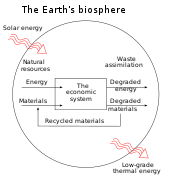
Back اقتصاد إيكولوجي Arabic Ekoloji iqtisadiyyat Azerbaijani Екоикономика Bulgarian Economia ecològica Catalan Ekologická ekonomie Czech Økologisk økonomi Danish Ökologische Ökonomie German Economía ecológica Spanish Ökoloogiline ökonoomika Estonian Ekonomia ekologiko Basque
| Part of a series on |
| Ecological economics |
|---|
 |
| Part of the behavioral sciences |
| Economics |
|---|
 |
Ecological economics, bioeconomics, ecolonomy, eco-economics, or ecol-econ is both a transdisciplinary and an interdisciplinary field of academic research addressing the interdependence and coevolution of human economies and natural ecosystems, both intertemporally and spatially.[1] By treating the economy as a subsystem of Earth's larger ecosystem, and by emphasizing the preservation of natural capital, the field of ecological economics is differentiated from environmental economics, which is the mainstream economic analysis of the environment.[2] One survey of German economists found that ecological and environmental economics are different schools of economic thought, with ecological economists emphasizing strong sustainability and rejecting the proposition that physical (human-made) capital can substitute for natural capital (see the section on weak versus strong sustainability below).[3]
Ecological economics was founded in the 1980s as a modern discipline on the works of and interactions between various European and American academics (see the section on History and development below). The related field of green economics is in general a more politically applied form of the subject.[4][5]
According to ecological economist Malte Michael Faber, ecological economics is defined by its focus on nature, justice, and time. Issues of intergenerational equity, irreversibility of environmental change, uncertainty of long-term outcomes, and sustainable development guide ecological economic analysis and valuation.[6] Ecological economists have questioned fundamental mainstream economic approaches such as cost-benefit analysis, and the separability of economic values from scientific research, contending that economics is unavoidably normative, i.e. prescriptive, rather than positive or descriptive.[7] Positional analysis, which attempts to incorporate time and justice issues, is proposed as an alternative.[8][9] Ecological economics shares several of its perspectives with feminist economics, including the focus on sustainability, nature, justice and care values.[10] Karl Marx also commented on relationship between capital and ecology, what is now known as ecosocialism.[11]
- ^ Anastasios Xepapadeas (2008). "Ecological economics". The New Palgrave Dictionary of Economics 2nd Edition. Palgrave MacMillan.
- ^ Jeroen C.J.M. van den Bergh (2001). "Ecological Economics: Themes, Approaches, and Differences with Environmental Economics," Regional Environmental Change, 2(1), pp. 13-23 Archived 2008-10-31 at the Wayback Machine (press +).
- ^ Illge L, Schwarze R. (2006). A Matter of Opinion: How Ecological and Neoclassical Environmental Economists Think about Sustainability and Economics Archived 2006-11-30 at the Wayback Machine. German Institute for Economic Research.
- ^ Paehlke R. (1995). Conservation and Environmentalism: An Encyclopedia, p. 315. Taylor & Francis.
- ^ Scott Cato, M. (2009). Green Economics. Earthscan, London. ISBN 978-1-84407-571-3.
- ^ Malte Faber. (2008). How to be an ecological economist. Ecological Economics 66(1):1-7. Preprint.
- ^ Victor, Peter (2008). "Book Review: Frontiers in Ecological Economic Theory and Application". Ecological Economics. 66 (2–3): 2–3. doi:10.1016/j.ecolecon.2007.12.032.
- ^ Mattson L. (1975). Book Review: Positional Analysis for Decision-Making and Planning by Peter Soderbaum. The Swedish Journal of Economics.
- ^ Soderbaum, P. 2008. Understanding Sustainability Economics. Earthscan, London. ISBN 978-1-84407-627-7. pp.109-110, 113-117.
- ^ Aslaksen, Iulie; Bragstad, Torunn; Ås, Berit (2014). "Feminist Economics as Vision for a Sustainable Future". In Bjørnholt, Margunn; McKay, Ailsa (eds.). Counting on Marilyn Waring: New Advances in Feminist Economics. Demeter Press/Brunswick Books. pp. 21–36. ISBN 9781927335277.
- ^ Erald Kolasi (April 2021), "The Physics of Capitalism", Sustainable Human Development, The Jus Semper Global Alliance